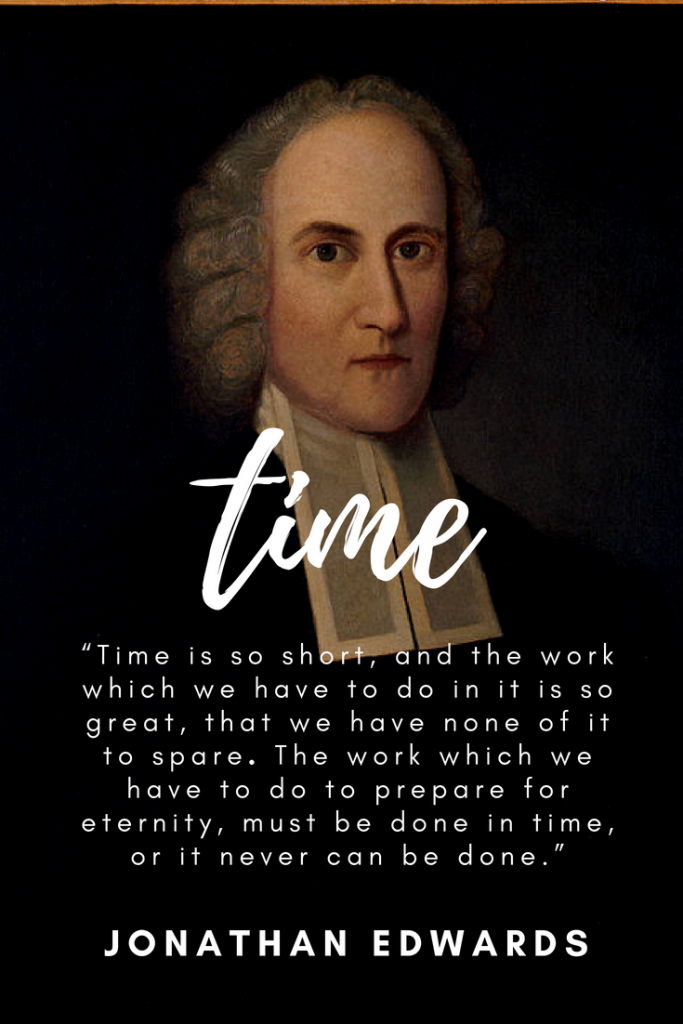What is the most valuable resource in the universe? Jonathan Edwards would answer that question with, “time.”
Time is the most precious resource in the universe.
Dated December of 1734, Puritan pastor Jonathan Edwards’s, short essay The Preciousness of Time and The Importance of Redeeming It from Ephesians 5:16 is one of the most convicting things you may ever read. This short work was very formative for me. It helped develop my convictions on the worth of every moment of my time. It also helped me see that it is, in fact, not my time at all. Time doesn’t belong to us. We are merely stewards of the Lord’s time, and there is much to do in a short amount we’ve been entrusted with.
From that essay, here are Edwards’s four reasons why time is precious.
1. Time is Precious Because Eternity Depends on It
Edward’s first reason that time is precious is “because a happy or miserable eternity depends on the good or ill improvement of it.”
Time is precious because eternity hinges on how we spend it.
He argues that people put the highest value on the things which are most concerning to their interests. He illustrates this using money. “Gold and silver are esteemed precious by men; but they are of no worth to any man, only as thereby he has an opportunity of avoiding or removing some evil, or of possessing himself of some good.” Thus, how much more precious is time than money. “Hence it is that time is so exceedingly precious, because by it we have opportunity of escaping everlasting misery, and of obtaining everlasting blessedness and glory.”
Productivity, of course, has a lot to do with time—saving time, using time wisely, and not wasting time—but secular productivity gurus cannot answer the ultimate question of what you should give time to and why. They don’t care if your interest in productivity is to make more money or be a better student. But Christian productivity concerns itself not just with the how of productivity but the what and the why.
So here we have Jonathan Edwards offering us some truly Christian productivity advice. Time isn’t just precious because “time is money,” time is precious because eternity hinges on how we spend it. If we do not cling to Christ in faith for the forgiveness of our sins and imputation of His righteousness before the final sand falls from our hourglass, we are lost forever. And if, as Christians, we do not maximize the hours we are given for God’s glory, we forfeit opportunities to honor our savior and obtain heavenly reward in accordance with our labors.
2. Time is Precious Because it is Very Short
In macroeconomics what is it that drives prices in the market? Supply and demand. Those resources which are a plentiful drop in price, while those which are scarce are deemed more valuable. So, it is with the scarcest commodity of all, time. James writes of life’s brevity, calling the whole sum of our time on this planet “a vapor” (James 4:14). Similarly, Edwards writes, “Time is so short, and the work which we have to do in it is so great, that we have none of it to spare. The work which we have to do to prepare for eternity, must be done in time, or it never can be done.”

Herein is another principle that guides how the productive Christian lives his life. The scarcest resource, time, requires the most considered care in how we invest it. Again, Christian productivity is not merely about tips and tricks to do things faster or more efficiently. Our concern must be greater than that. The productive Christian takes great pains to ensure that he is investing his brief life in matters of eternal import.
3. Time is Precious Because We Do Not Know How Much We Have
We know that our lives are brief, but no one knows how brief his life will be.
This point is slightly different from the previous one. “We know that [time] is very short, but we know not how short.” Edwards explains of time, “We know not how little of it remains, whether a year, or several years, or only a month, a week, or a day. We are every day uncertain whether that day will not be the last, or whether we are to have the whole day.”
His point is that the clock is ticking but we do not know when the alarm will sound. Today could be your last day, this second could be your last second.
This is why the advice to live every day as if it were your last has stood the test of time. It is profoundly true. We just don’t know how long we have. To the person who doesn’t know God, this is a terrifying thing to consider. Perhaps that is why so many fill their lives with a never-ending stream of information an entertainment, they hope all that noise will drown out the terrible thought that they will someday die.
But for the Christian knowing our time is short—and even that we don’t know how short it is—doesn’t mean we should live in a constant state of dread. We know where we are going when we die. For us, it simply means that there is no time to waste. We must live and serve our Lord and our fellow man with all energy and eagerness. We must be productive with the time we know we have because the only time we know for certain we have is right now. Procrastination has no place in the life of a person who knows his time may be almost up.
4. Time is Precious Because Once It’s Gone It’s Gone
Lastly, time is precious because it is a one-time-use commodity, or as Edwards put it, “time is very precious because when it is past, it cannot be recovered.” Edwards explains that money and possessions can be lost and recovered again. A man can lose his entire fortune, yet in the course of only a few years make back what he has lost. Not so with time. When time is gone, it is truly gone. Yet, how often do we, in laziness, watch our days and hours circling the drain of worthless pursuits?
The expression, “our days are numbered” is biblical. God has given us an allotted number of moments. Psalm 139:16 says, “In your book were written, every one of them, the days that were formed for me, when as yet there was none of them.” But once each one of those days is spent, it is spent forever. Edwards emphasizes this sobering reality by calling us to look back on the years wasted. “If we have lived fifty, or sixty, or seventy years, and have not improved our time, now it cannot be helped. It is eternally gone from us. All that we can do, is to improve the little that remains.”
Conclusion
We are tempted to run from this type of thinking, but that is exactly what we must not do. We cannot hide from the deep thoughts of our own mortality by clinging to shiny distractions. For the sake of eternity and the glory of our Master, we must face the truth of our temporality head-on. Edwards made a commitment in the fifth of his famous 70 resolutions. “Resolved, never to lose one moment of time; but improve it the most profitable way I possibly can.” We would be wise to take a similar pledge. And in light of it to take appropriate action, like scheduling our days.
There is no time to waste. Let us rise to the occasion and determine today that from this moment forward we will employ our time—rather, God’s time—productively for His glory. May we never look back on our lives and see that we have wasted the most precious commodity we have been given, time.
And if you are not a Christian, I urge you to hasten and not delay a moment longer. Run to Jesus Christ. Repent of your sin, repent of how you have spent God’s time in seeking self-pleasure and worthless pursuits of sinful disobedience to him. And trust wholly in Jesus, in His perfect life, His sacrificial death, and His victorious resurrection. Because God has put Him forth as the answer for sinful people like us. It is through Jesus alone that you can be reconciled to God and adopted as His son or daughter. And as a child of the King of Kings, you will receive an inheritance of eternal value and an eternity of time.
So, run to Jesus, while there’s still time.
This article has only presented the tip of the iceberg of Jonathan Edwards’s great work. I encourage you to read the whole thing, it’s not long. Here’s a free PDF version of Jonathan Edwards’s The Preciousness of Time and the Importance of Redeeming It
The Preciousness of Time by Jonathan Edwards (5671 downloads )


Thank you for this GREAT summary! I will be using it in my high school Health Class to talk about the importance of TIME MANAGEMENT (WISE use of time, not WASTING time) this week!
Blessings, brother!
Thanks for the comment, Michelle! Praying for you and the students in your Health Class this morning.
Thank you for the summary brother, I shall seek to employ my time well, this article was very helpful.
This is so true.
Beautiful sermons. I’ve touch my heart ????
We serve a great God who does far more abundantly beyond all that we ask or understand. (Ephesians 3v21) I have recently been looking to improve my time spent for God, and He providentially provided this course through you. I look forward to learning more, and serving Him better through what is learned here. Thank you so much, I have learned alot already, and pray that through Christ I may be a doer of the word.
Dr. Lawson once taught a sermon on this same resolution during the Resolved Conference (2012?). He used the example of his father frugal spending, “… and there is no one who can work a dollar like my dad…” Dr. Lawson noted going into a store and there would be special sales announced that would only be available for a short period of time (blue light specials). We only have certain seasons of time to do things for God. Some, are mere moments. We can act, or lose that chance forever. Redeem the time my friends.
amazing information. I will start working in applying a better time management in my life for the Lord